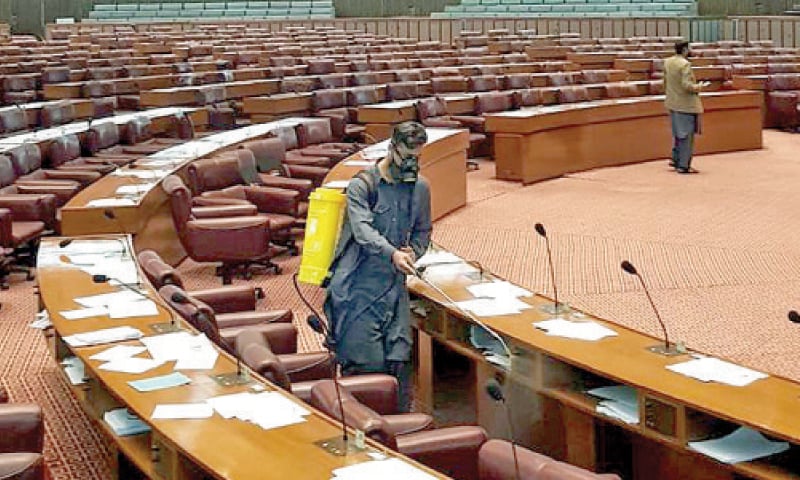ISLAMABAD: A second case of COVID-19, the disease caused by the novel coronavirus, has been confirmed in the capital while a number of sectors and segments of society who are vulnerable to the disease have not been addressed.
Pakistan Institute of Medical Sciences (Pims) media coordinator Dr Wasim Khawaja said the second patient is the husband of a woman who travelled from abroad to attend a wedding and tested positive for the virus.
He said: “The woman is still in critical condition on a ventilator. Moreover, a patient who has been shifted from Sargodha is also in critical condition and has been put on a ventilator.”
He said four patients have been admitted to the hospital, two of whom are serious.
Another doctor who asked to remain anonymous said that a woman who was brought to Pims from the northern areas and tested positive has recovered fully and a recent test came back negative.
Strategy to evolve as situation evolves, special assistant to PM says
Pakistan Medical Association General Secretary Dr Qaiser Sajjad said that there are a number of crucial areas that have been ignored by decision-makers.
“Although everyone says that people should adopt social distancing, the National Database and Registration Authority’s (Nadra) offices are open. People have no choice but to sit together, and the same biometric machine is used for everyone because it is mandatory to obtain a CNIC,” he said.
“A large number of people are invited to television programmes, especially morning shows. Thousands of people visit large stores and malls every day but no strategy has been made to address the issue,” he went on.
Dr Sajjad said that slum residents are believed to be safe because they are unlikely to travel abroad, but many women who live in slums work in the homes of people who frequently travel abroad.
“Residents of slums could be infected, and once they have the virus, it would spread rapidly because of the dense population. We also do not have a standard operating system for leave for women who work in homes, or labourers who work in factories or run transport,” he said.
In some areas, particularly slums and informal settlements, entire families live in one-room homes, because of which keeping suspected or confirmed patients in self quarantine at home would not be feasible.
He added: “A large number of Pakistanis have been kept in unhygienic conditions at the Taftan border, due to which human-to-human transmission of the virus could start there. After keeping people at Taftan, they are sent to provincial quarantine areas and kept together again so the virus can spread easily.”
Islamabad Deputy Commissioner Hamza Shafqaat admitted that the situation is worrisome, as there are a number of vulnerable locations.
“We are also worried about weekly bazaars, when tens of thousands of people visit, about mosques as thousands of people attend the Friday prayers at Faisal Mosque and big stores and parks. The government has established a number of committees and they meet frequently, so we are hoping a policy will come soon,” he said.
“We have been holding meetings on the issue and will come up with a policy soon,” National Institute of Health Executive Director Maj Gen Dr Aamer Ikram said.
“As far as the issue of Taftan is concerned, it was serious but we have been focusing on it due to which we will hopefully stop the virus,” he said.
It has been decided to evolve a strategy as the situation evolves, Special Assistant to the Prime Minister on Health Dr Zafar Mirza said.
“Currently, we have decided that mild to moderate patients should self-quarantine, and only critical patients will be admitted to hospital,” he said.
Meanwhile, Parliament House was fumigated on Sunday to reduce the possibility of the spread of the coronavirus.
A statement issued by the Capital Development Authority said all the halls, rooms and other parts of Parliament House were fumigated.
The current outbreak of COVID-19 was first reported from Wuhan, China, in December 2019. So far, 162,700 cases have been reported in more than 150 countries. There have been 6,069 deaths and 76,219 patients have recovered. There have been 52 reported cases in Pakistan, and two people have recovered and been allowed to return home.



